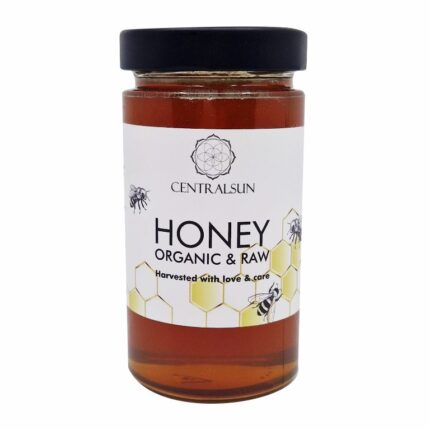Introduction to Organic Honey
A Taste of Nature’s Goodness
There’s something uniquely comforting about a spoonful of honey—its silky texture, rich taste, and natural sweetness instantly connect us to the earth. But organic honey is in a league of its own. Unlike conventional honey, it’s produced without synthetic chemicals, antibiotics, or pesticides. That means cleaner, purer, and more nutrient-dense honey straight from the hive to your table.
Organic honey captures the essence of nature. The bees that produce it forage on organically grown flowers and thrive in an environment free from harmful toxins. This not only keeps the honey free from contaminants but also supports a more sustainable and ethical method of beekeeping.
Why Organic Honey Is More Than Just a Sweetener
Sure, organic honey tastes amazing in tea or drizzled over toast—but its uses and benefits go way beyond sweetness. From healing wounds to soothing sore throats and even nourishing your skin, organic honey is nature’s multipurpose elixir. It’s been used for thousands of years in traditional medicine and is now making waves in modern wellness circles.
What makes organic honey truly magical is its combination of antibacterial, anti-inflammatory, and antioxidant properties. Unlike refined sugars that just spike your blood sugar, honey offers energy with a side of nutrition. Whether you’re looking to improve your health or simply make better food choices, organic honey is a small change with a big impact.
What Is Organic Honey?
The Definition and Standards Behind “Organic”
Organic honey isn’t just a marketing buzzword—it’s a certification that guarantees purity. For honey to be labeled as “organic,” it must meet stringent standards set by certification bodies like the USDA or EU Organic. This includes ensuring the bees are raised without exposure to synthetic chemicals and antibiotics, and that they forage only on organically grown plants.
The land within a specific radius of the hives must also be free from chemical treatments. Beekeepers must follow natural and sustainable beekeeping practices that support the health and longevity of the bees.
How Organic Honey Is Produced
The production process starts with selecting safe, uncontaminated locations—typically in remote areas where pollution and pesticides are minimal. Beekeepers use natural methods to care for the bees, avoid artificial feeding, and prevent diseases using herbal or natural remedies.
When it’s time to harvest the honey, no heat or harsh processing is used. Organic honey is often raw, unfiltered, and unpasteurized. That means it retains all the natural enzymes, vitamins, and minerals that are often destroyed in conventional processing.
Organic Certification Requirements
To be labeled as organic, honey producers must undergo rigorous inspections and maintain full traceability from hive to jar. Certification involves:
- Organic management of floral sources
- No use of synthetic chemicals or GMOs
- Natural disease control for bees
- Non-chemical extraction and processing
In short, organic honey is clean, traceable, and ethically produced. It’s honey the way nature intended—no shortcuts, no toxins, just golden goodness.
Health Benefits of Organic Honey
Antioxidant-Rich and Immune-Boosting
Organic honey is packed with antioxidants like flavonoids and phenolic compounds. These natural substances help combat oxidative stress and neutralize free radicals, reducing the risk of chronic diseases like heart disease, cancer, and neurodegenerative disorders. Regular consumption of organic honey can give your immune system the boost it needs, especially during flu season.
Thanks to its antibacterial properties, organic honey can help your body fight infections. It’s even been shown to kill harmful bacteria like E. coli and Staphylococcus aureus. Some studies suggest that daily consumption can reduce inflammation and improve overall immune function.
Natural Energy Source and Metabolism Enhancer
Unlike refined sugar, which offers empty calories, organic honey contains a balanced mix of glucose and fructose, making it a quick and natural source of energy. Athletes often use it as a pre- or post-workout snack to restore glycogen levels and fight fatigue.
The natural sugars in organic honey also stimulate metabolism and improve blood sugar regulation when consumed in moderation. And because it’s digested slower than regular sugar, it provides sustained energy without the crash.
Organic Honey for Digestive Health
Organic honey contains natural prebiotics that feed your gut’s good bacteria, promoting a healthier digestive system. It’s especially helpful in relieving conditions like acid reflux, gastritis, and bloating.
Its antimicrobial properties help combat harmful gut pathogens, while its soothing texture lines the stomach, providing relief from ulcers and other gastrointestinal irritations. A tablespoon of organic honey mixed with warm water and lemon can work wonders for digestion when taken first thing in the morning.
Organic Honey vs. Regular Honey
Farming Practices and Bee Treatment
One of the biggest differences between organic and regular honey lies in how the bees are treated and where they forage. Regular honey may come from hives near pesticide-sprayed crops, while organic bees roam in pesticide-free environments. Organic beekeepers avoid synthetic treatments and feed the bees naturally, whereas conventional beekeeping may involve antibiotics and sugar water.
The treatment of bees directly affects the honey’s quality. Organic honey ensures the well-being of the bees and protects biodiversity, while regular honey production may compromise both.
Purity and Processing Differences
Organic honey is typically raw and unfiltered. That means it hasn’t been heated or ultrafiltered, preserving all the enzymes, vitamins, and antioxidants. Regular honey, especially store-bought brands, often goes through pasteurization and filtration, which strips away many of its beneficial properties.
You might notice that organic honey crystallizes faster—don’t worry, that’s actually a sign of purity. Crystallization happens when the natural sugars in honey solidify, and it’s a good indicator that your honey hasn’t been overly processed.
Taste, Texture, and Nutritional Content
Organic honey often has a richer, more complex flavor than regular honey. The taste can vary based on the region and the flowers the bees visited, offering a delightful range of floral notes. It’s also thicker and more opaque due to its unfiltered nature.
Nutritionally, organic honey contains slightly higher levels of beneficial compounds like antioxidants, enzymes, and minerals. While both types of honey have similar calorie content, organic honey offers more functional benefits per spoonful.
Conclusion: Why Organic Honey Deserves a Place in Your Life
Organic honey isn’t just a healthier version of your regular sweetener—it’s a full-spectrum wellness ingredient that supports your body inside and out. From strengthening your immune system and boosting digestion to enhancing your skincare routine and replacing processed sugars, its benefits are both diverse and scientifically backed. Choosing organic honey means choosing purity, sustainability, and a product that stays as close to nature as possible.
By making this simple switch in your kitchen or medicine cabinet, you’re not only doing your body a favor—you’re supporting ethical farming practices and protecting the environment, one spoonful at a time. Whether you’re drizzling it over your morning oats, mixing it into a DIY face mask, or using it to soothe a sore throat, organic honey delivers nourishment with every drop.
So, next time you’re at the store or shopping online, go for the golden jar labeled “organic.” Your body (and taste buds) will thank you.
FAQs
1. How can I tell if honey is truly organic?
Look for certification labels like USDA Organic or EU Organic on the packaging. Genuine organic honey will often be raw, unfiltered, and might crystallize over time—a natural sign of purity.
2. Is organic honey safe for everyone to consume?
While organic honey is safe for most people, it should not be given to infants under one year due to the risk of botulism. People with severe pollen allergies should also consult their doctor.
3. What’s the best way to store organic honey?
Keep it in a cool, dry place away from direct sunlight. You don’t need to refrigerate it. If it crystallizes, simply warm it gently in a water bath to restore its texture.
4. Can I use organic honey in cooking and baking?
Absolutely! Organic honey works wonderfully in recipes as a natural sweetener. It can replace sugar in teas, marinades, salad dressings, and baked goods.
5. Does organic honey expire?
Organic honey doesn’t spoil due to its low moisture and high acidity. However, for the best flavor and benefits, it’s recommended to use it within two years of purchase.









